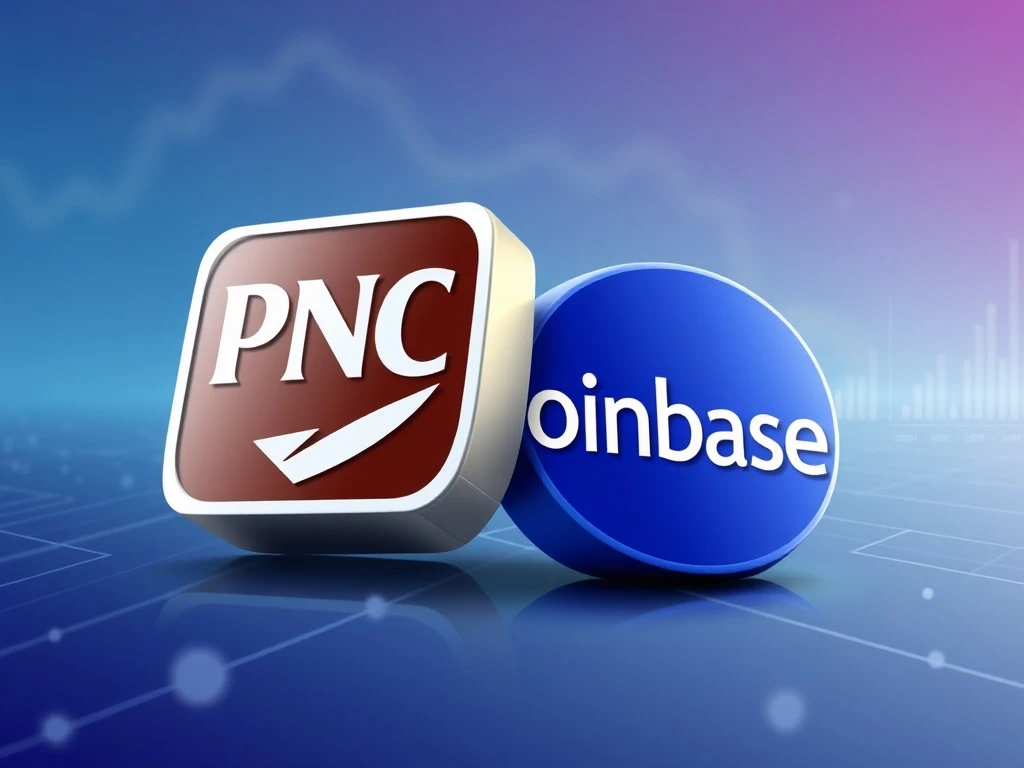PNC Coinbase Collaboration: Unlocking Transformative Crypto Services Post-2025 Legislation

In a move that’s set to redefine the landscape of traditional finance and cryptocurrency, PNC Bank, one of the largest U.S. financial institutions, has announced a significant PNC Coinbase collaboration. This partnership, formalized in July 2025 following the passage of pivotal federal crypto legislation earlier that year, marks a major step towards mainstream adoption of digital assets. For anyone watching the evolution of money, this collaboration signals a new era where secure, streamlined crypto services are becoming readily available through established banking channels.
A New Era for Crypto Services: The PNC Coinbase Collaboration Unveiled
The core of this strategic alliance revolves around integrating crypto trading, custody, and digital asset services directly into PNC’s offerings for both its retail and institutional clients. Imagine being able to securely buy, hold, and sell cryptocurrencies like Bitcoin and Ethereum right from your trusted bank account – that’s the future PNC is building. This is made possible by leveraging Coinbase’s cutting-edge Crypto-as-a-Service (CaaS) platform [1].
- Seamless Integration: PNC customers gain access to a secure, regulated pathway to engage with digital assets.
- Bidirectional Benefits: While PNC taps into Coinbase’s crypto expertise, Coinbase, in turn, gains access to PNC’s robust banking infrastructure, including crucial settlement services. This creates a mutually beneficial relationship designed to expand both entities’ market reach.
- Legislative Catalyst: The timing is no coincidence. The new federal crypto legislation passed in early 2025 has provided the regulatory clarity needed for traditional financial institutions to confidently explore and integrate digital assets.
William S. Demchak, PNC Chairman and CEO, highlighted that this collaboration directly addresses the growing client demand for “secure and streamlined access to digital assets” through a platform they already trust. Similarly, Brett Tejpaul, head of Coinbase Institutional, emphasized the CaaS platform’s ability to provide PNC with scalable tools for a “high-growth business built on uncompromising security” [2].
Why Major Banks Are Embracing Digital Assets
PNC’s bold move isn’t an isolated incident; it reflects a broader institutional confidence in crypto as a legitimate asset class. The industry has been buzzing with reports suggesting that institutional adoption of digital assets is increasingly seen as inevitable, despite the lingering challenges related to risk [3].
Beyond traditional cryptocurrencies, PNC is also actively exploring stablecoin-related services. In July 2025, the bank announced plans to leverage its existing payment technology to support crypto companies, aiming to attract “meaningful clients” in this rapidly evolving sector [6]. Stablecoins are crucial as they offer a bridge between the fiat and crypto ecosystems, providing stability in an often-volatile market.
Coinbase’s Strategic Play: Powering Institutional Crypto Adoption
For Coinbase, this partnership with a major financial institution like PNC is a cornerstone of its strategy to strengthen its institutional client base. The CaaS platform, tailored specifically for institutional clients since early 2025, offers comprehensive features like custody and trading solutions designed to meet the stringent demands of professional investors [4].
By partnering with PNC, Coinbase gains a regulated and trusted partner, significantly enhancing the credibility and trust in its services. This is a critical factor for institutional investors who prioritize risk mitigation and regulatory compliance above all else. The arrangement is purely based on the factual details provided by both companies, steering clear of speculative forecasts about market growth [7].
Decoding the Market Reaction: What Coinbase Shares Tell Us
The market’s immediate reaction to the announcement was, surprisingly, mixed. While PNC’s stock saw a slight uptick, Coinbase shares experienced a noticeable dip, falling by 3.7% in the aftermath. This divergence highlights varying investor perceptions of the partnership’s immediate value and potential implications.
Why the dip for Coinbase? Investors might be factoring in the potential for increased competition as more traditional banks enter the crypto space, or perhaps the perceived dilution of Coinbase’s direct retail market share as banks offer similar services. Alternatively, some might see the integration as a long-term play with upfront costs, rather than an immediate revenue booster for Coinbase. Regardless, it underscores the complex dynamics at play as traditional finance and crypto continue to converge.
The Future Landscape of Finance: Blending TradFi and Crypto
This PNC Coinbase collaboration underscores the rapid maturation of the crypto industry. Traditional banks are no longer just observing; they are actively seeking to offer clients diversified investment options that include digital assets. The bidirectional nature of this agreement – with PNC providing banking services to Coinbase – further highlights the growing interdependence between traditional finance and crypto platforms [5].
This dynamic is expected to accelerate significantly as more institutions enter the space, driven by legislative frameworks that effectively reduce operational uncertainties and provide a clearer path for engagement. The integration of crypto into mainstream banking is not just a trend; it’s becoming an integral part of the financial future.
Conclusion: A Pivotal Moment for Digital Assets
The partnership between PNC Bank and Coinbase is more than just a business deal; it’s a landmark event signifying the deepening integration of digital assets into the global financial system. It validates the growing demand for secure crypto services, paves the way for greater institutional crypto adoption, and showcases how regulatory clarity can unlock immense potential. While the immediate market reaction to Coinbase shares was mixed, the long-term implications for both companies and the broader crypto market are overwhelmingly positive, promising a more accessible and regulated future for digital finance.
Frequently Asked Questions (FAQs)
1. What is the main purpose of the PNC and Coinbase collaboration?
The collaboration aims to integrate crypto trading, custody, and digital asset services directly into PNC Bank’s offerings for both retail and institutional clients, leveraging Coinbase’s Crypto-as-a-Service (CaaS) platform. It allows PNC customers to securely buy, hold, and sell cryptocurrencies like Bitcoin and Ethereum.
2. How does this partnership benefit both PNC and Coinbase?
PNC gains access to Coinbase’s expertise and platform for crypto services, meeting growing client demand for digital assets. Coinbase, in turn, gains access to PNC’s robust banking infrastructure, including settlement services, expanding its reach and gaining a regulated partner, which enhances trust among institutional investors.
3. What role did the 2025 federal crypto legislation play in this collaboration?
The passage of federal crypto legislation in early 2025 provided the necessary regulatory clarity and framework that accelerated traditional financial institutions like PNC Bank in their exploration and integration of digital assets into their services.
4. Why did Coinbase shares fall despite the positive partnership news?
The 3.7% drop in Coinbase shares could reflect varying investor perceptions. Possible reasons include concerns over increased competition as traditional banks enter the crypto space, potential dilution of Coinbase’s direct retail market share, or the view that the integration is a long-term play with upfront costs rather than an immediate revenue boost for Coinbase.
5. What are “digital assets” and why are traditional banks embracing them?
Digital assets refer to anything that exists in a digital format and comes with the right to use, such as cryptocurrencies (Bitcoin, Ethereum) and stablecoins. Traditional banks are embracing them due to growing client demand, increasing institutional confidence in crypto as a legitimate asset class, and the inevitability of digital asset adoption in the evolving financial landscape.









